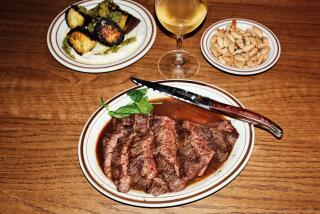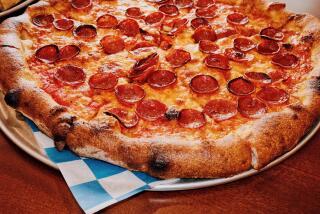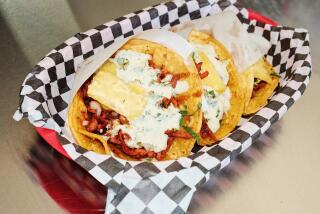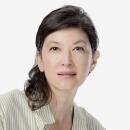Sushi 101 on order for L.A.
- Share via
WHEN A restaurateur is faced with a sushi chef shortage, what to do? Open a sushi school. Master sushi chef Katsuya Uechi of the Katsuya restaurant empire has teamed with the president of Japanese food importer Mutual Trading Co. to launch a professional sushi school in downtown Los Angeles. The Sushi Institute of America is set to open this month.
Uechi is chef-owner of Sushi Katsu-Ya in Studio City and Encino and executive chef of SBE Entertainment Group’s growing chain of Philippe Starck-designed Katsuya restaurants -- there are three in the L.A. area and more are slated for Miami (in 2009) and Las Vegas (in 2010).
By opening a sushi school, Uechi says he hopes to address a shrinking pool of professional sushi chefs in the U.S. (Other Los Angeles sushi schools include the 10-year-old California Sushi Academy and the Sushi Chef Institute, founded in 2002.)
The SIA is adjacent to one of Mutual Trading’s warehouses on an industrial stretch of 4th Street, which also houses one of the country’s few super-freezers (it purportedly freezes fish so quickly that cell integrity isn’t jeopardized) -- 65 degrees below zero and filled with, you guessed it, toro (tuna belly)!
The school offers a two-month basic course that covers fundamentals such as Japanese knife handling and sharpening, selecting and cutting fish, how to prepare sushi rice, and presenting and serving rolled sushi, nigiri sushi and sashimi, as well as seafood safety regulations.
The one-month advanced course is for those aspiring to begin a career as professional sushi chefs, with job-placement opportunities at Katsuya restaurants. Uechi says that he will be teaching a couple of days a week. Non-professional courses also will be offered.
“It’s very hard to find good sushi chefs, especially nowadays,” says Uechi, who will be SIA’s executive instructor and is a graduate of Japan’s Tsuji Culinary Institute. “Right now all the sushi restaurants are short-handed.”
Mutual Trading’s Noritoshi Kanai started business in the U.S. by importing Japanese brewed rice vinegar and in 1965 persuaded the owner of erstwhile Kawafuku restaurant in Little Tokyo to build L.A.’s first sushi bar. “It’s in our industry’s interest to build a not-for-profit school,” Kanai says. “Sushi is the core of Japanese food culture in the U.S., but with the increase of sushi restaurants, we are finding a lack of chefs, and the techniques of local sushi chefs is declining.”
For example, “living in Japan, you know that you’re not supposed to eat certain fish in certain seasons. Here, anything goes. People think raw fish is raw fish.”
Adds Uechi, “Seasoning and flavors are changing a lot, compared to the traditional way. Sometimes it’s good, sometimes it’s bad. The good part is that we are dealing with American tastes so we should adjust flavors, and some people do it well. But some fish, some sauces, some vegetables don’t match sometimes. That’s the bad part. If I can teach how to make sushi well, that’s good.”
Sushi Institute of America, 843 E. 4th St., Los Angeles, (213) 617-8090, www.myspace.com/ sushischool.
--
More to Read
Eat your way across L.A.
Get our weekly Tasting Notes newsletter for reviews, news and more.
You may occasionally receive promotional content from the Los Angeles Times.











